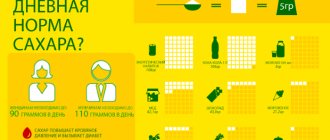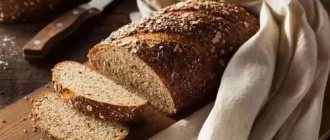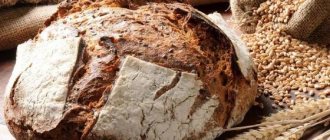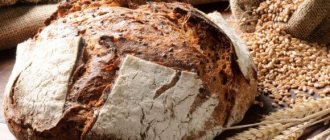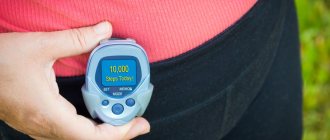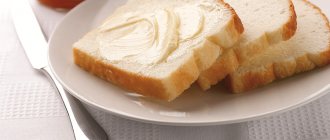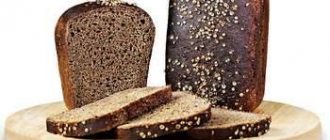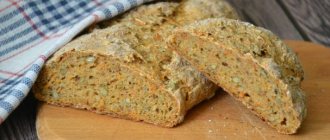For many decades, any meal was accompanied by the consumption of bread. “Bread is the head of everything” and other proverbs instill respect for this food product from childhood. However, in recent years, low-carbohydrate diets have become fashionable, and it has been proven that regular consumption of flour products leads to abdominal obesity, increases the risk of developing diabetes, and strains the gastrointestinal tract. What happens if you don't eat bread? Will my health improve and will I be able to lose weight? And won't this lead to negative consequences for health and well-being? The article describes what will happen if you don’t eat bread for at least a few weeks.
Bakery products are a source of carbohydrates for the body
Wheat, rye, whole grain flour - rarely have any of us thought about the share of products made from it in the daily diet. Meanwhile, if you do not monitor your dietary intake, you can easily exceed the proportion of carbohydrates consumed. Bakery products are primarily carbohydrates, a few grams of vegetable protein and very little fat. This is the balance of BJU in bread, regardless of what flour it is made from.
And those with a sweet tooth who prefer buns, cookies and other products made from butter or lean dough with sugar, in addition to a large amount of complex carbohydrates, also receive a huge amount of simple ones. Bakery products can contain both simple carbohydrates (which directly affect weight gain and blood sugar levels) and complex carbohydrates (which serve as a source of energy for the human body).
Healthy bread recipes
And we will also share with you recipes for healthy bread.
First recipe
You need to knead a plastic dough from 4-5 cups of wholemeal flour and half a liter of mineral water. Sprinkle a baking tray with flour and place the dough on it. Bake in a preheated oven for up to one and a half hours, flatbreads for up to 20 minutes. To make a pastry, add another glass of mineral water and 2 teaspoons of condensed milk to the dough.
Second recipe
For the dough you will need: 1 kg of wholemeal flour, 1 glass of mineral water, 100 grams of honey, 100 grams of vegetable oil. Preheat the oven to 50 degrees and dry the flatbread in it. This bread is alive, store it in the refrigerator in cling film.
What happens if you give up carbohydrates
Carbohydrates provide the body with the energy it needs for mental and physical activity. Accordingly, when eating bread, a person receives a portion of energy. Since carbohydrates are simple, it requires immediate release, otherwise fat deposits will begin to accumulate.
If you give up carbohydrates completely, then in the first days the body will experience a state of shock. A person is almost guaranteed to experience the following “pleasant” sensations:
- weakness (asthenia);
- decreased performance;
- very strong appetite - after eating protein food it does not subside, since the body understands that it has not been given something, as a result of which there is no satiety;
- constipation - on a low-carb diet, you should definitely take extra fiber so that digestion does not stop;
- drowsiness;
- bad mood, irritability - this is how the body lets you know through the nervous system that it doesn’t have enough carbohydrates.
The relationship between the development of diabetes mellitus and carbohydrate intake
Even if you don't eat bread, you can still develop type 1 or type 2 diabetes. This is primarily due to poor heredity. The second factor that influences the possibility of developing the disease is an increase in the consumption of sugar and other simple carbohydrates,
What happens if you don't eat bread if you have diabetes? This disease involves a forced refusal of simple carbohydrates and strictly limited consumption of complex ones. Therefore, people with diabetes are forced to refuse to eat bread, and only occasionally can they afford to eat a slice of Borodinsky. Otherwise, blood sugar levels immediately creep up.
A blow to the immune system?
Article on the topic
So that the student does not get sick. Strengthening a child's immunity A study conducted in 2009 in Spain showed that even a month of a gluten-free diet was enough to significantly reduce the population of beneficial bacteria in the intestines. Another study found that gluten has a beneficial effect on the human immune system. In addition, with a gluten-free diet, weight is lost not due to a decrease in body fat, but due to the loss of fluid and muscle mass: this is the so-called “meager diet”. The kilograms quickly return both when the diet is canceled and when grains are replaced with some more high-calorie or fatty foods.
It is possible that gluten will soon officially join the ranks of substances whose avoidance is hazardous to health.
Irina PETRENKO
Types of bread and effects on health and the body
Not all bread makes you fat. If you don’t have diabetes, then you can safely eat Borodino bread for breakfast. This is the healthiest option: unlike white and whole grain bread, it does not lead to obesity.
Bread with the addition of wheat bran is good - if it is made from white flour, then the calorie content will be high. But bran will help normalize digestion.
If you have the opportunity to regularly purchase bread made from oatmeal or buckwheat flour, that’s very good. These varieties contain a minimum of carbohydrates and can be eaten for breakfast. Eating bread made from buckwheat and oat flour will give you energy for the whole day, but will not contribute to excess weight gain.
What happens if you stop eating bread? Not temporarily, but on a permanent basis? It turns out that nothing bad will happen - on the contrary, when the body adapts to the new diet, health will improve and excess weight will go away. These are just two points out of seven. Yes, there are five more reasons to give up bread. To find out more, read the next section. It may change your life forever.
Is it possible to eat while losing weight?
With the right variety and moderate consumption, bread is useful for weight loss because:
- contains fiber, which ensures long-term saturation;
- charges you with the energy that is so lacking when following a diet, when carbohydrate consumption is reduced to a minimum;
- saturates the body with vitamins and minerals, the lack of which is often found in poor diets.
At the same time, you need to understand that it is not for nothing that bread is on the list of prohibited foods for most diets. Let's take everyone's favorite Borodinsky as an example. Its calorie content per 100 g is 208 kcal. A thin piece (1/2 of a cut rectangle) weighs 25 g, that is, it contains 52 kcal, which is quite a lot for such a small weight. It's even worse with a loaf. In Narezny - 264 kcal, and in one thin slice (30 g) - as much as 79 kcal. These numbers need to be closely monitored. If you manage to fit them into your daily calorie intake, you can include this product in your diet menu.
In addition, bread is often made from premium flour, which is a refined product. And they, as you know, are the undoubted enemies of losing weight. Therefore, for a dietary diet, it is better to choose whole grain or peeled products.
Seven reasons not to eat bread for an adult
From the list below, only two or three points may seem important to someone. But this is quite enough to change your diet:
- Avoiding bread in your diet will help lower your blood sugar. This will serve as an excellent prevention of the development of type 2 diabetes.
- White flour contains gluten. Recent studies have proven that this substance can lead to flatulence and the development of chronic diseases.
- Any person, even with a hereditary tendency to be overweight, will lose weight by giving up baked goods (since they are very high in calories).
- Modern bread contains yeast, preservatives, flavorings and other chemicals in smaller or larger quantities.
- Bread contains a minimum of vitamins and microelements - there are products with much higher nutritional value.
- Enzymes (often genetically modified) are added to flour and dough to make loaves of bread larger and remain soft for days or even weeks.
- Regular consumption of bread leads to a deterioration in intestinal function in some people, in particular a decrease in peristalsis.
How to replace flour products?
You can replace flour and unhealthy sweet baked goods with the right alternatives and nutritional approaches. Here are some tips:
- Plan your menu in advance, avoid spontaneous purchases and make a list.
- Eat as many vegetables and fruits as possible, replacing foods you previously consumed with them. If you want cookies, eat an apple, and you will see that the cravings are gone.
- Include cereals in your diet, as they fill you up well.
- Reduce the amount of sugar in tea and coffee, gradually this need will simply disappear. You can add cinnamon or nutmeg.
- Replace milk with rice milk (easy to make at home), almond milk or soy milk.
- Bread for diabetics will be an excellent alternative to buns. Then you give them up too.
- Replace the buns with a honey bread sandwich or avocado spread.
- If you are sensitive to honey, you can eat a piece of marshmallow and some dark chocolate.
- Replace snacks with sandwiches with a small amount of dried fruits and nuts;
- Prepare healthy drinks from mint, ginger, and berries. They will reduce your cravings for flour and baked goods.
- Also prepare cocktails or smoothies in the morning with low-fat dairy products, with the addition of vanilla, cinnamon, and cocoa. This will prevent you from spontaneously snacking on cookies.
Try to get enough of healthy and healthy food, eliminating flour completely.
What will happen to the body if you give up bread only occasionally?
To begin with, you can give up baked goods only partially. Completely eliminate buns and cookies, and eat bread only in the morning and at lunch. As a rule, this change in diet alone is enough to reduce weight and improve your well-being.
What happens if you don't eat bread for a week? This time for radical changes is quite short. To notice more or less pronounced changes in your well-being, you should not eat baked goods for at least two months. During this time, metabolism will have time to readjust. Under no circumstances should you go hungry or undernourish: protein products, as well as cereals high in complex carbohydrates, should take the place of bread. If you switch to a completely carbohydrate-free diet, this can be a blow to the body and subsequently lead to even more weight gain. At least in the morning you should consume a minimum amount of simple carbohydrates.
How to lose weight without bread?
In order to noticeably lose weight in the shortest possible time, in addition to bread, you will have to give up a number of other products. First of all, this applies to all flour products , not just bread. All kinds of puff pastries, buns, pies, pasties, pasta, etc. should now become a strict taboo for you. Exceptions may be products made from wholemeal flour - they are not so high in calories.
You should also give up all sweets . Forget about cakes, sweets, pastries, biscuits and other usual desserts. But there is an exception here: from time to time you can eat a few squares of dark dark chocolate. Also avoid fatty and fried foods . When you see shelves with sausages, sausages, smoked meats, lard, etc. in a supermarket, you decisively walk by. Fried foods, in turn, should be avoided, since such dishes are not only particularly high in calories, but also poison the body with cholesterol.
How much weight can you lose if you exclude baked goods from your diet?
This question interests mainly girls. It is difficult to give an exact answer to this - the numbers depend on individual parameters.
If you give up baked goods completely, then on average weight loss occurs by 1-3 kg per week. The more excess weight, the faster it will go away in the first weeks. If there are only a few extra kilos, then the weight can be only half a kilo per week.
For breakfast, it is permissible to eat a couple of pieces of Borodino bread. If a person’s goal is only to lose weight, then taking this food product will not affect the intensity of getting rid of excess fat.
How to survive carbohydrate withdrawal without unnecessary stress
What happens if you don't eat bread at all? At first, the body will persistently demand the amount of calories and the ratio of nutrients to which it is accustomed. To minimize the consequences of giving up bread, you can try to implement the following tips:
- eat more fruits rich in fiber and fructose;
- in no case limit, and if possible even increase the share of protein in the diet;
- find yourself a hobby that would help distract you from the desire to eat fast carbohydrates;
- drink as much clean water as possible - this trick will help create a feeling of satiety;
- introduce fermented milk products into your diet on a regular basis.
Medical advice: who is a low-carb diet contraindicated?
A complete abstinence from carbohydrates is not always a good thing. To eat bread or not - everyone must decide for themselves. At a minimum, you should leave porridge, vegetables, and fruits in your diet. With a complete refusal of carbohydrates, the urinary system suffers - the kidneys simply do not have time to remove protein breakdown products, which can deteriorate the functionality of this paired organ.
With a low-carb diet, you can completely eliminate bread, but you must consume carbohydrates in moderation with other foods. This diet is contraindicated for people with chronic kidney disease, impaired liver function, and impaired metabolism.


